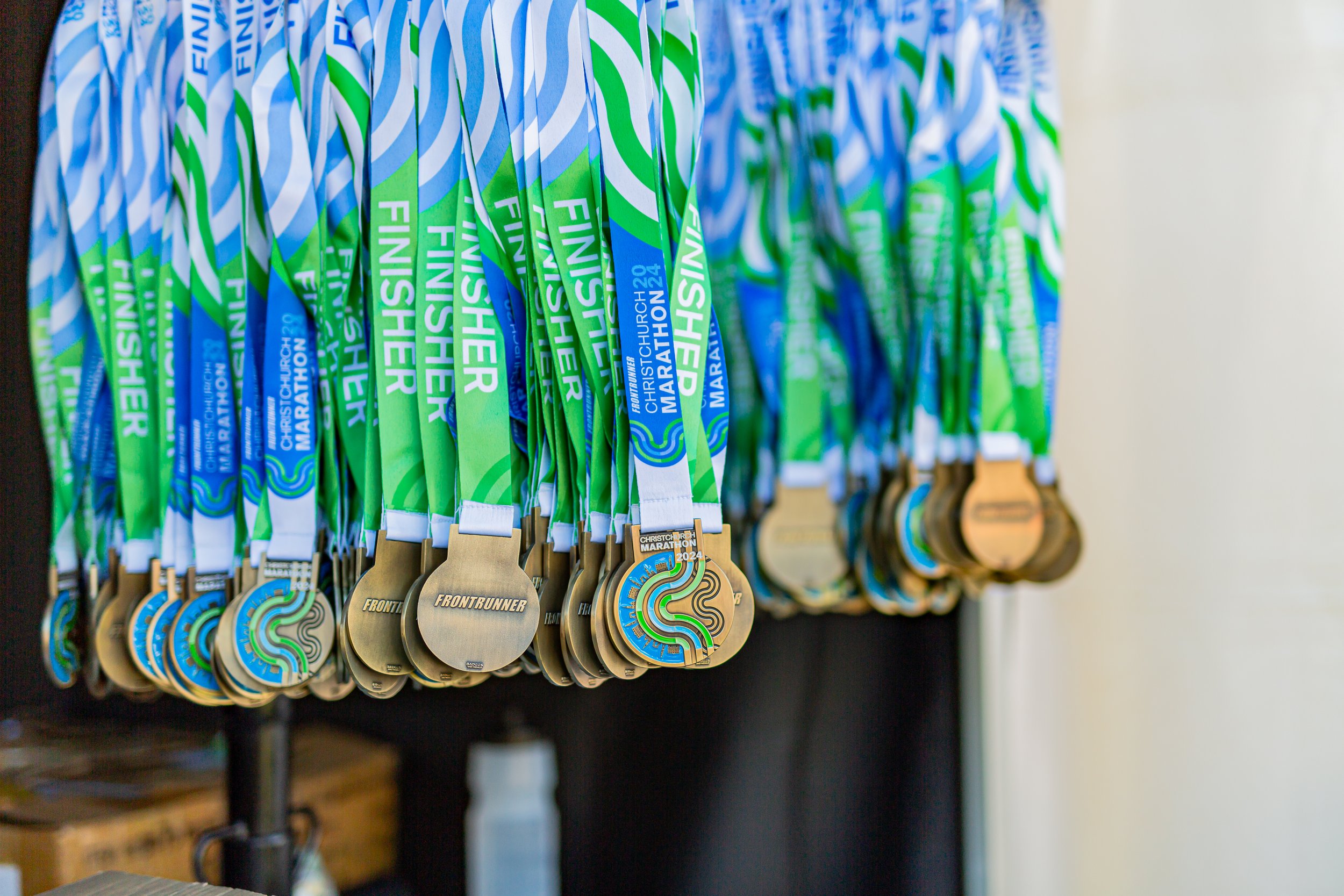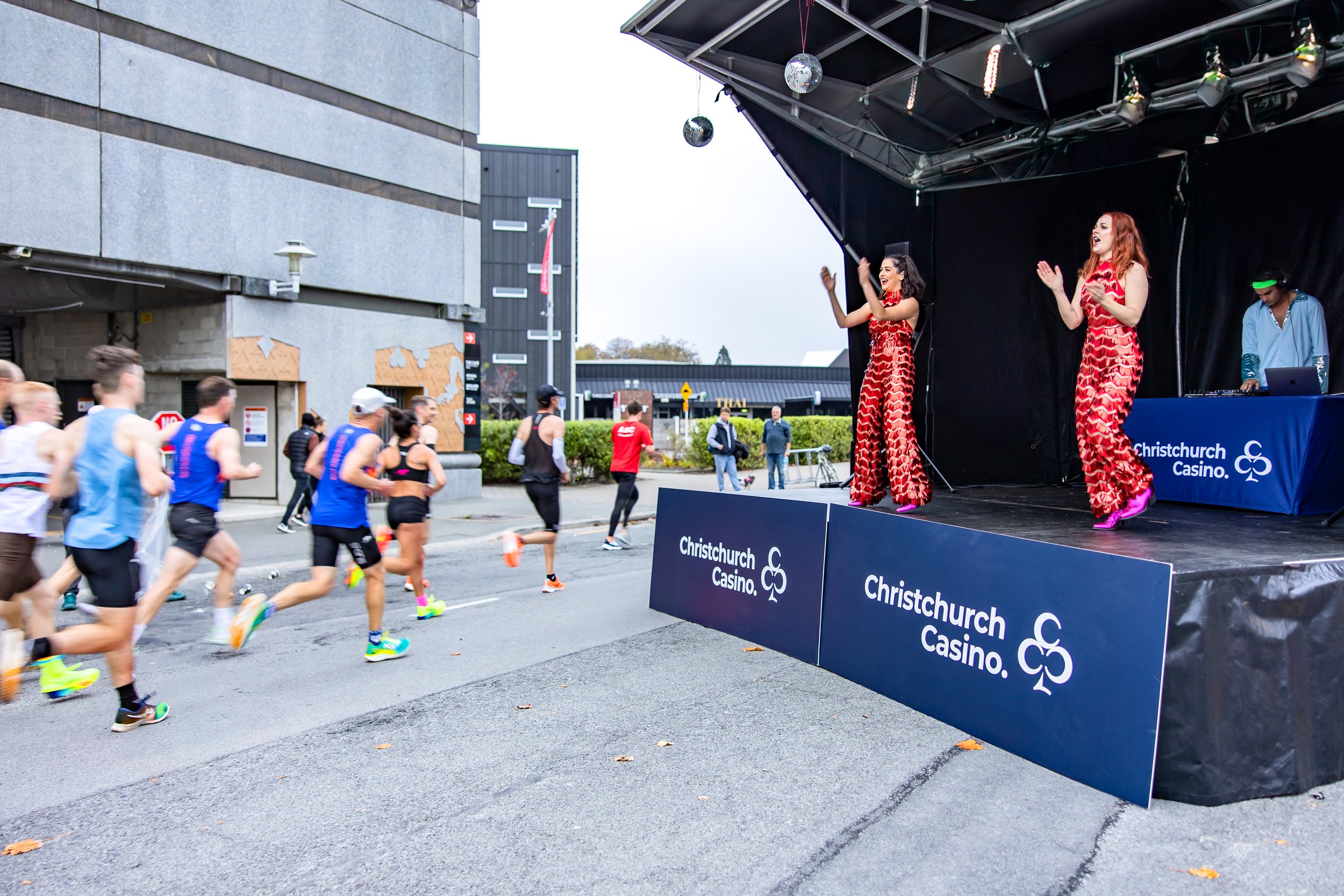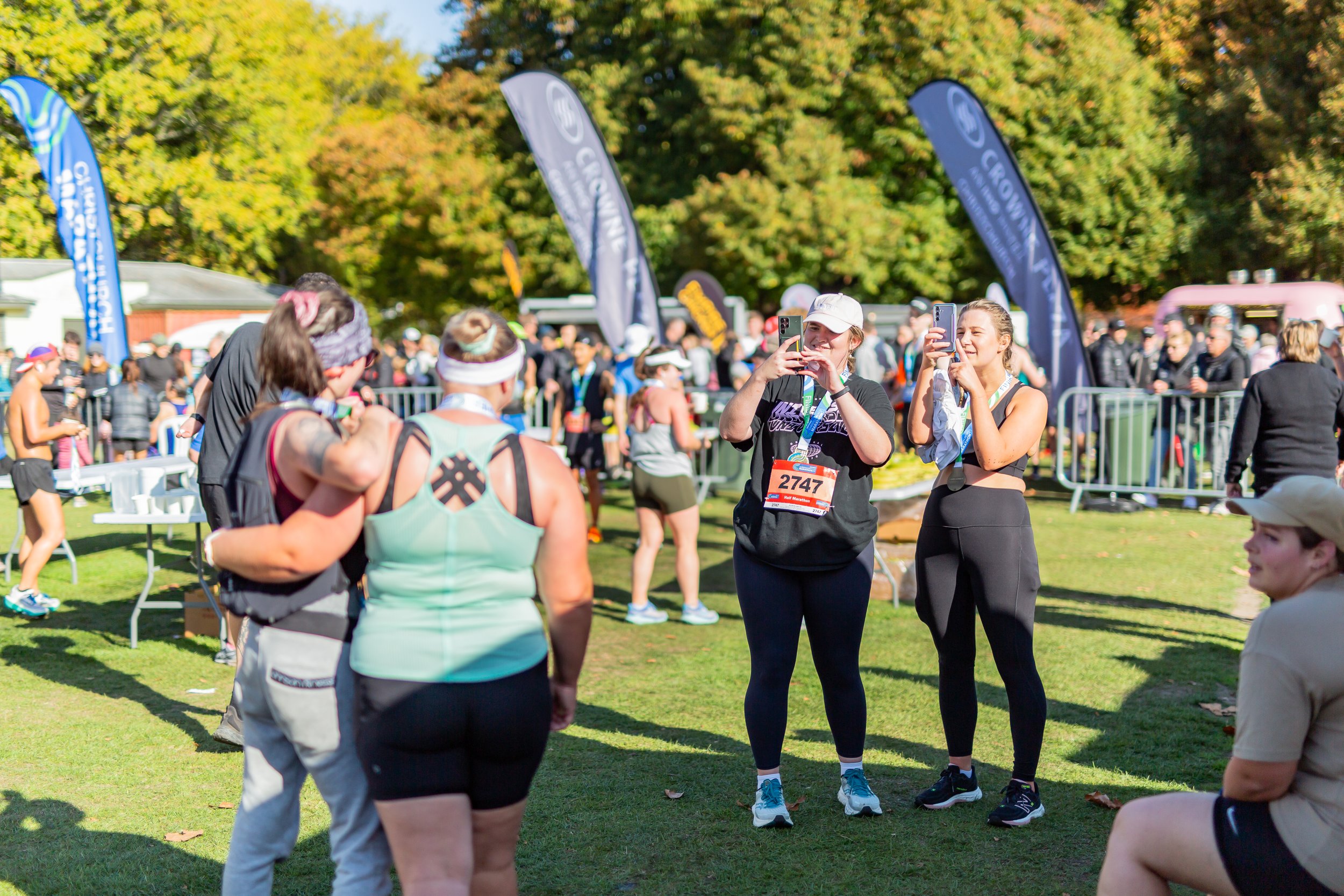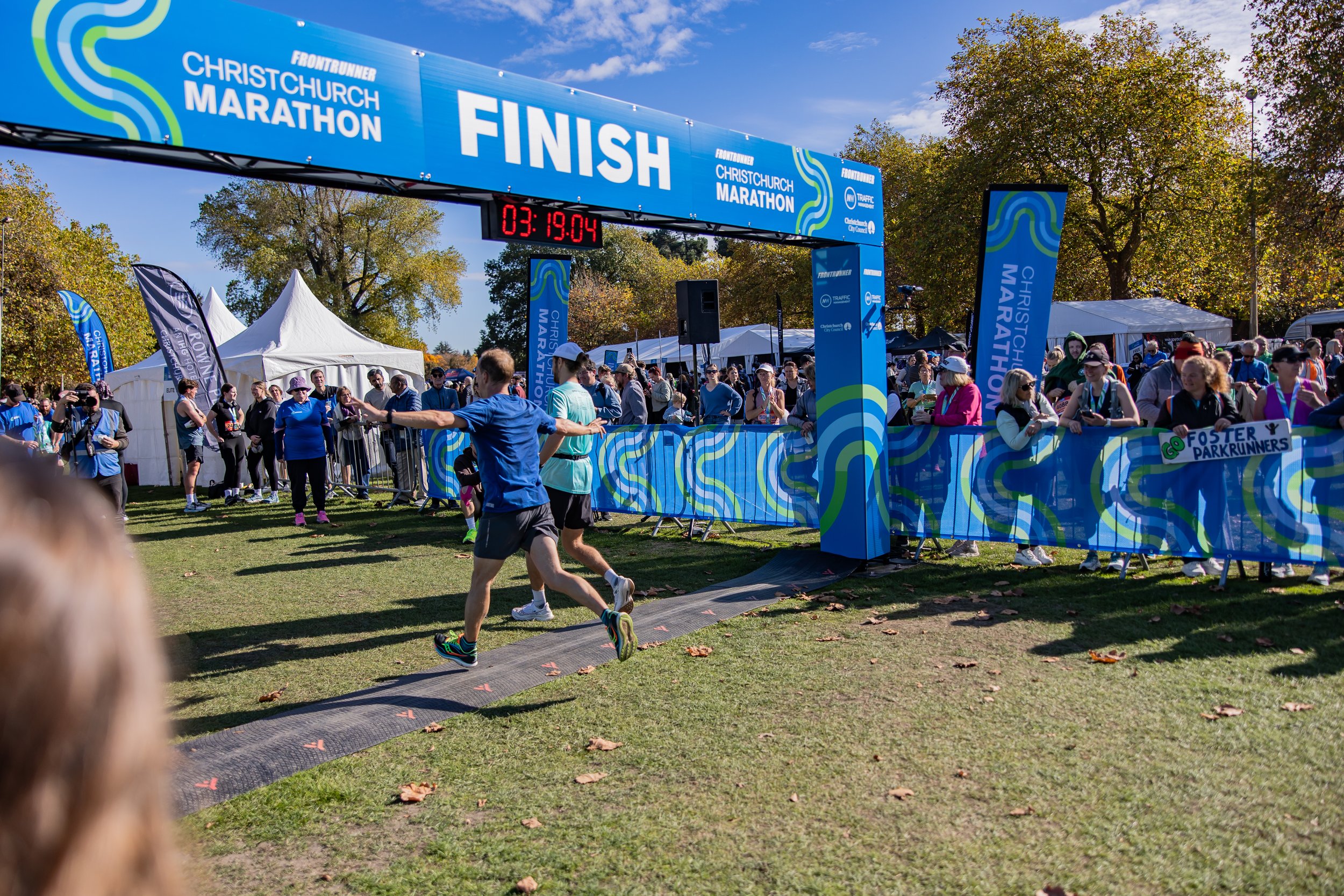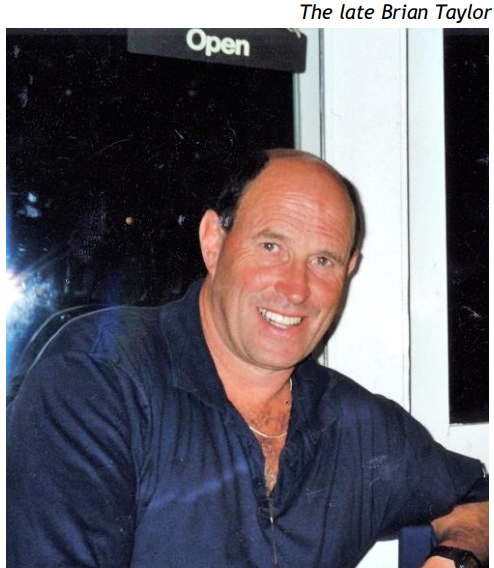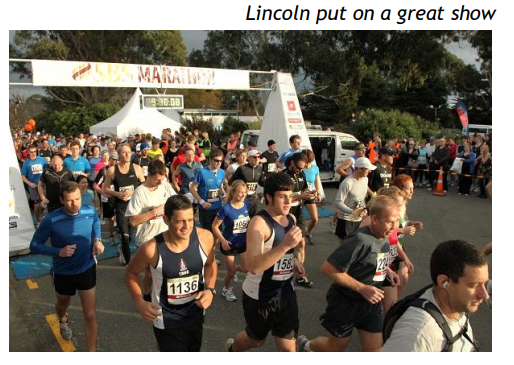
History
From Whence We Came
The marathon took its inspiration from one of the greatest athletic feats in history. And the Christchurch Airport Marathon took its inspiration from one of the greatest marathons in history.
Marathon running, as we know it, hails back to Athens in 1896 and the first modern Olympiad. But the inspiration for this most classic of challenges hails back to a mythical Greek messenger named Pheidippides. Depending on which of history’s great bards you believe, Pheidippides ran 24 miles between Marathon and Athens to announce an Athenian victory in the Battle of Marathon.
Upon delivering the message he dropped down dead, and so was born the great nobility of long distance running and the challenge they eventually dubbed “the marathon.” It was that great tale that inspired the first Olympic marathon and a quarter of a century later a similarly inspiring race took place right here in Christchurch.
Like the marathon itself, the Christchurch Marathon was inspired by one of the greatest races in history; n the 1974 Christchurch Commonwealth Games, on the same basic route that our race used until the 2010 earthquakes, Great Britain’s Ian Thompson ran what was then the second fastest marathon of all time. It was one of history’s greatest marathon races.
Favourites included the two fastest men in history, Australia’s Derek Clayton and Great Britain’s Ron Hill. Clayton held the world’s fastest marathon at 2hrs 08min 28secs while Hill was the defending Commonwealth Champion, Boston Marathon winner and second fastest ever with 2:09.28. But it was an unknown Brit and an underrated New Zealander who set the roads alight.
Ian Thompson was a surprise selection for the English marathon team, winning his debut marathon at the English trials to book a ticket to New Zealand. Rotorua’s Jack Foster had booked his ticket for New Zealand some 20 years previously when he left the UK to become a Kiwi. The cycling enthusiast only took to running at age 33, but by 37 he was a world-class marathoner and had finished fourth at the 1970 Commonwealth Games behind Hill.
With so many world class runners in the marathon field the pace was always going to be fast. After looking over the flat course and fast line-up Derek Clayton said he wouldn’t be surprised if the world record was broken.
With Hill and Clayton both merciless frontrunners the early pace did indeed go out at world record schedule, with 10k going by in 30min 30secs and halfway under 64min. Thompson had been calling the shots since 15k and when he opened up 10m at the halfway turn, no one could close it and the Englishman ran away to an amazing 2hrs 09min 12secs.
It was the second fastest time in history and behind him Jack Foster was dragged along to a New Zealand record 2hrs 11min 18secs to secure the silver medal. Even more noteworthy, however, was Foster’s age; at 41 he became the fastest masters marathoner in history.
More than 40 years later, Ian Thompson’s effort remains the fastest marathon ever run on New Zealand soil. Foster’s run is still the fastest ever by a New Zealander in New Zealand and his masters world record lasted until 1990 when another New Zealander (and Christchurch Marathon winner), John Campbell, trimmed a few seconds of it in Boston. In the wake of such as race it was no surprise that people started taking to the streets of Christchurch.
This was the mid-70s; the fitness boom was starting to take hold and the Commonwealth Games had inspired New Zealanders like never before. In 1978, Christchurch long distance guru, Don Cameron, and the Long Distance Running Club of New Zealand decided to bottle that inspiration into an annual marathon over the historic Commonwealth Games course. Cameron wasn’t a man to do things in halves. In 1974 he had made his own bit of history when running the 2200k between Bluff and Cape Reinga.
At Queens Birthday Weekend 1978 he made more history: organising New Zealand’s first mid-winter marathon, the first New Zealand marathon to combine a half marathon and the first New Zealand marathon to welcome recreational runners alongside official club runners.
The race was called the Sedley Wells Midwinter Marathon. It broke new ground, mixing the American fun run formula with New Zealand’s officious club scene. Five hundred and twenty-five people from all ends of New Zealand, Australia, the UK and USA lined up. Christchurch’s popular Tony Good took the win ahead of other equally colourful personalities such as Penny Kissock and Alison Tait, who became the fastest South Island women (3:01.55 & 3:05.55) while 14 year old Michael Marquet and 55 year old Frances Clarke became the youngest person and eldest woman to finish a marathon in New Zealand.
Despite this success and an increase of almost 25 percent the following year, the event was still not quite what Cameron had envisaged. Council traffic restrictions had forced them to run a two-lap course from QEII stadium around Horseshoe Lake and River Road before returning on Avonside Drive. But by 1981 the event was almost up to 1000 participants and so successful that Council allowed Cameron and coorganiser Rod Rutherford to re-kindle the historic Commonwealth Games course… and the “City of Christchurch International Marathon” was born.
The 1974 Commonwealth Games course started at QEII Stadium and followed the Avon River through the central city and Hagley Park, then up Memorial Avenue to Christchurch Airport and back. It was flat, fast and scenic. But it also had a wonderful “rent-a-crowd” appeal, passing as it did the letterboxes of several thousand residents.
Rekindling this course was a stroke of genius, with Rod Rutherford’s marketing ability attracting sponsors and more than 1000 runners. Wellington’s Steve Denholm won, breaking the 2hrs 20min barrier, while Christchurch’s own Christine Burden became one of the 10 fastest Kiwi women with 2hrs 44min 05sec. Following years saw Kiwi standouts such as Gerald Dravitzki, John Dixon, Tom Birnie and John Campbell take the record down to a classy 2hrs 15min 12secs.
Campbell’s 1986 win qualified him for the Commonwealth Games, but Birnie dominated this first decade with four marathon wins between 1984 and 1992 and a half marathon win as well. His 2hrs 15min 12secs in 1985 is still the race record. Women have enjoyed an illustrious history in Christchurch. In 1982 Japan’s Naenai Sasaki clocked a world class 2hrs 35min to set a Japanese record.
Since then women from England, USA and Australia have triumphed, as have Kiwi Olympians such as Marguerite Buist and Liza Hunter-Galvan. But Sasaki’s 2hrs 35min remains the fastest and she went on to represent Japan in 1984’s inaugural women’s Olympic marathon and was the first Japanese woman to break 2hrs 30min.
Christchurch was also the first marathon to include a half marathon option and the list of winners is just as illustrious. Olympic medallist Dick Quax (1984), Olympic finalist Peter Renner (1991 & 1992) and world mountain running champion Jonathan Wyatt set the national resident record (2002). Kiwi Olympians such as Dianne Rodger (1982), Anne Hare (1993, 97), Nyla Carroll (2002, 03), Nina Rillstone (2004, 05, 08) and Mary O’Connor have also won the Christchurch half.
Mary O’Connor is an icon over the half marathon at Christchurch, setting a national record in 1984 during a 13-year reign that saw her win 11 times overall and four as a master. Her 1:11.41 stood until 2005 when Nina Rillstone set a NZ record of 1:10.49. Men have also run fast in the half marathon. In 1994 Christchurch’s own Paul Smith ran a scorching race record 1:02.41.
That time withstood challenges from people as classy as Birnie, Renner and Alan Bunce, until 2001 when Commonwealth Games reps Bunce and Phil Costley made a concerted attempt that saw Costley equal Smith’s time. The following year Costley had another crack, but world mountain running champion Jonathan Wyatt stole the home-town hero’s thunder with 1:02.37 that equalled Dick Quax’s 23- year-old record for the fastest half marathon to be run on New Zealand soil.
Among masters men, 1967 Boston Marathon winner Dave McKenzie set the trend by winning the vets half marathon in 1983. His West Coast training partner Eddie Gray, a former world cross-country medallist, followed suite with a string of wins, including a 1:06.18 in 1985 that stood as the masters half marathon record until 2010 when Phil Costley clocked 1:06:01.
Masters have always run fast at Christchurch, starting with the inaugural Full Marathon when Jack Foster returned at age 48 to clock an amazing 2hrs 22min 48secs that is still the masters course record. Canterbury’s own Allan Sinclair, who was second in 1983, came close to Fosters masters record in 1999 when he finished second overall in 2hrs 22min 55secs.
During the 1980s, Allan Sinclair the nearly-man of New Zealand marathon running. In 1982 he ran his best time of 2hrs 16min in the Commonwealth Games trials but missed the team by two placings. He was a place getter in almost every major marathon, including several narrow loses in Christchurch. But after more than a decade away from the sport he came back as a master to win the 2000 Christchurch Marathon. In many ways Allan Sinclair was no different to thousands of others who keep coming back to Christchurch’s favourite race. From under 1000 in 1981, by the year 2000 the event had grown to 3500.
There have been tough times, though. The late-80s share market crash impacted sponsorship, which affected promotion. The mid-90s growth of the event industry left Christchurch’s volunteer organisation looking old-fashioned and by 1996 participation had dropped from 3000 to just over 1000 and the full marathon was cancelled due to simple lack of interest.
In 1997, however, the new race director, Chris Cox – a previous third place getter in the Christchurch Marathon, introduced professional event management and a shift in venue, from QEII Stadium to the iconic Christchurch Town Hall. With increased sponsorship, slicker organisation and a central city base, the event suddenly had a New York-type feel with more community presence and visitor convenience. The introduction of a 10k fun run, walk options and the Kids’ Mara’Fun saw year-on-year growth, until 2010 when 5800 participants from 12 countries lined up.
But then in late 2010 and early 2011, Christchurch was hit hard by earthquakes that created havoc in the city and effectively ruined the Avon River route of the traditional Commonwealth Games course.
The earthquake of September 2010 didn’t impact the event hugely, but the serious aftershock of February 2011 did. The Christchurch Town Hall start/finish venue was condemned, many of the roads we used were ruined and entire neighbourhoods that the event ran through were levelled.
Among almost 200 earthquake deaths, the Christchurch Marathon lost Brian Taylor, a top runner during the 1970s and one of the founding drivers behind the Christchurch Marathon. Brian was race director for several years and even coached his wife Prue to win the women’s Full Marathon in 1990. In 1996 Brian was the person who prompted the shift to a professional organisational structure and when he died in the collapse of the CTV building he was Chairman of the City of Christchurch International Marathon Trust that governs the event.
With so much emotional and organisational stress in the weeks following the February 22 aftershock, we didn’t think the event could be staged in 2011; with Christchurch having so much on its plate, we weren’t sure there would be demand.
But by early April support from the public, council and sponsors kickstarted a rethink. The challenge was finding a course that didn’t add to the City’s stresses that also had a venue big enough to host the event. Lincoln University, on the outskirts of the City, turned out to be the only viable alternative.
Incredibly, more than 3000 participants lined up at Lincoln. Less that the record 5800 entries of the previous year but given the eight week build up and earthquake stresses, it was a huge success. However, while Lincoln itself was a great venue the course was not particularly inspiring, and we started making plans straight away to get the event back into the City.
A new sponsorship with Christchurch International Airport helped our case, and they agreed to host the event within their campus on the outskirts of Christchurch and with fields of around 4000 for the next three years, it was clear Christchurch’s motivation for the event was still there.
The motivation has still been high among New Zealand’s best runners, with Dale Warrander winning the Half Marathon for the third time at Lincoln in 1:06.14. But the post-earthquake years were dominated by internationals. The full marathon at Lincoln was a see-saw battle between Phil Costley and Singapore’s Ying Ren Mok, before Mok got the upper hand in the final few kilometres to win in a Singapore record of 2hrs 26min 34secs.
Mok returned in 2012 to break Singapore’s record in the half marathon but was well beaten by Kenyan 19- year-old Kip Kemei, who led from start to finish to win in 1:05.01. But these winners were overshadowed by a woman on the comeback from running’s worst shame.
Liza Hunter-Galvan was one of New Zealand’s top marathoners between 2002 and 2009, attending two Olympics and breaking 2hrs 30min. The Texas-based Aucklander had won her debut marathon in 1999’s Christchurch Marathon, but in 2009 she tested positive for blood-boosting drug EPO and was suspended.
The 2011 Christchurch Marathon was her first race back and while it caused controversy, Hunter-Galvan won in 2hrs 45min 31secs. She returned in 2012, 2013 and 2014 and won them all, with 2014’s record fifth win being the fastest in 2hrs 43min 40secs, which was also a new masters women’s race record. Two years later she returned for one final win, before retiring.
While still very much an interim while we worked on getting back to the central city, the semi-rural course around the Airport proved popular and quite fast. In 2012 Timaru’s Sam Wreford set a personal best 2hrs 17min 30secs. Coached by 1960 Rome Olympic bronze medallist, Barry Magee, Wreford returned in 2013 but illness saw him fail to finish and 43-year-old Phil Costley notched up his fourth Christchurch win (three full marathons and one half marathon).
In 2014, however, Wreford was undeniable, shrugging aside a sub-zero frost and icy roads to set another personal best time of 2hrs 16min 28secs that might well have been a record in more favourable conditions. Another Cantabrian on the rise has been Callan Moody. In 2014 he surprised even himself to win the half marathon ahead of national champion Malcolm Hicks and several sharp Aussies in a personal best 1:06.06. It was a breakthrough for Moody, who went on to national cross country and road titles and then returned to Christchurch in 2015 for a second win.
In 2015, after four years of hard work behind the scenes, the Christchurch Airport Marathon returned to the central city. After consulting with Council and every business and resident affected by the event, we received approval for a route that wasn’t yet back to our traditional course but which was still a scenic and spectator friendly tour around iconic Christchurch landmarks such as Cathedral Square, Hagley Park, Oxford Terrace, Canterbury Museum and the Avon River.
It proved fast too, with Callan Moody winning again in a personal best 1:05.13. In an exciting race, a crack field trailed Australian Jonathan Peters by 40secs at the 15k mark. Moody and Malcolm Hicks worked together to close the gap, then Moody went solo in the final 3k, sweeping past the Australian in the final kilometre to win what was also the national title.
The women’s race proved just as fast, with Australian Milly Clark winning in 1hr 14min 09min ahead of rising Kiwi stars Lydia O’Donnell and Rachel Kingsford. The full marathon saw 27-year-old trainee doctor, Alice Mason, win her first marathon in 2hrs 45min 43secs. Japan’s Hiroshi Tanimoto won the men’s race by three minutes in 2hrs 24min 13secs, while 45-year-old Phil Costley came from fifth to second in the final 10k.
While the return to the central city was well-received, the challenge shifted from returning to city to being able to afford an event of this scale in the modern world. The cost of compliance surrounding traffic management and health and safety is ever increasing. By 2015, the organisational cost had reached half a million dollars and if these inflationary and compliance costs can’t be contained, the future of the event will be under threat. But we push on, because frankly, the alternative is to not hold the event, which for this organisational group is not an option.
The longer we organise this event, the more the event changes but stays the same. In 2019 we literally went back to the future, returning after nine years to the home of the event at the Christchurch Town Hall. It was fitting too, for just as the Town Hall has had to be rebuilt from the inside out, so too has the ASB Christchurch Marathon.
Watching 4000-plus starters get underway outside the Christchurch Town Hall again was an emotional moment. But it was also a challenging day of bitter southerly wind and rain that saw flooding on parts of the course.
But it didn’t affect the racing. Local lad, Oska Baynes, became the first to win the 10k (2015), 21k (2016) and 42k with a fast 2hrs 18min 11secs to win the NZ title.
Among women, Alice Mason added another 42k win to her 21k (2018) and 42k debut (2015) wins. She also became the first woman to win three NZ marathon titles in a row with a personal best 2hrs 39min 17secs.
In the half marathon Daniel Balchin added 2019 to his 2017 win, while Dunedin’s Margie Campbell was a surprise winner among women. There was special interest too, as former Australian Olympian Shaun Creighton set a 50-59yr course record of 2hrs 30min 23secs that was also an Australian 50-54yr record.
No one put up a more impressive performance, however, than Whangarei’s Dave Eastmond. The 81-year-old became our eldest ever full marathon finisher, stopping the clock at 5hrs 36min 26secs.
Despite such a positive 2019, there are still challenges. The mass mosque shooting in March hit Christchurch hard and forced huge security measures for public events. But hundreds came out for the marathon to show support for Christchurch and the mosque victims, including 28-yearold Ashleigh Stewart, a former Press journalist now living in the UAE, who returned home to run the marathon with the names of every victim on her shirt.
Principal sponsor ASB also put their best foot forward, donating five dollars to Youthline for every person who ran an extra 20 metres to their ASB Youthline finish line. By days end finishers had run more than 72 extra kilometres and raised almost $20,000.
Initiatives like this are badly needed in Christchurch. There is still much to be done rebuild-wise, and similarly the marathon’s rebuild is far from complete.
Covid-19 didn’t help and for the first time in its 40 years the event wasn’t held due to the nationwide lockdown. But in itself this may have been a blessing. It gave us a chance to step back and analyse what we do and more time to execute some initiatives we hope will re-invigorate an event that has not quite recovered since the earthquakes.
Since 2016 the event has been assaulted with cold, wet weather and the enthusiasm of the masses was starting to waver. So in 2021 the event will have a new date of April 11 where weather is traditionally mild and consistent.
And after years of working with Council to re-claim our pre-earthquake course, we are almost there. The 2021 course will be almost a carbon copy of pre-2011 route.
Why, you may ask, are we so zealously focused on reclaiming the traditional course? Because it is iconic, because it is scenic and as results in 2019 illustrated, it is still the fastest in New Zealand. But more than anything, we’re holding on to it because word is the red zone areas it runs through will become public park lands with wide cycle paths that would make a brilliant course even better.
With a new date and our preferred course in place, this really is a new era for what is now the “ASB Christchurch Marathon”. But regardless of where the event heads from now, one thing remains the same… Since 1981, the Christchurch Marathon has always been, and will always be, an event organised by runners for runners.
